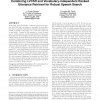Free Online Productivity Tools
i2Speak
i2Symbol
i2OCR
iTex2Img
iWeb2Print
iWeb2Shot
i2Type
iPdf2Split
iPdf2Merge
i2Bopomofo
i2Arabic
i2Style
i2Image
i2PDF
iLatex2Rtf
Sci2ools
SIGIR
2009
ACM
2009
ACM
Combining LVCSR and vocabulary-independent ranked utterance retrieval for robust speech search
Well tuned Large-Vocabulary Continuous Speech Recognition (LVCSR) has been shown to generally be more effective than vocabulary-independent techniques for ranked retrieval of spoken content when one or the other approach is used alone. Tuning LVCSR systems to a topic domain can be costly, however, and the experiments in this paper show that Out-Of-Vocabulary (OOV) query terms can significantly reduce retrieval effectiveness when that tuning is not performed. Further experiments demonstrate, however, that retrieval effectiveness for queries with OOV terms can be substantially improved by combining evidence from LVCSR with additional evidence from vocabulary-independent Ranked Utterance Retrieval (RUR). The combination is performed by using relevance judgments from held-out topics to learn generic (i.e., topic-independent), smooth, non-decreasing transformations from LVCSR and RUR system scores to probabilities of topical relevance. Evaluated using a CLEF collection that includes top...
Information Retrieval | Large-Vocabulary Continuous Speech | Relevance Judgments | Retrieval Effectiveness | SIGIR 2009 |
| Added | 28 May 2010 |
| Updated | 28 May 2010 |
| Type | Conference |
| Year | 2009 |
| Where | SIGIR |
| Authors | J. Scott Olsson, Douglas W. Oard |
Comments (0)

